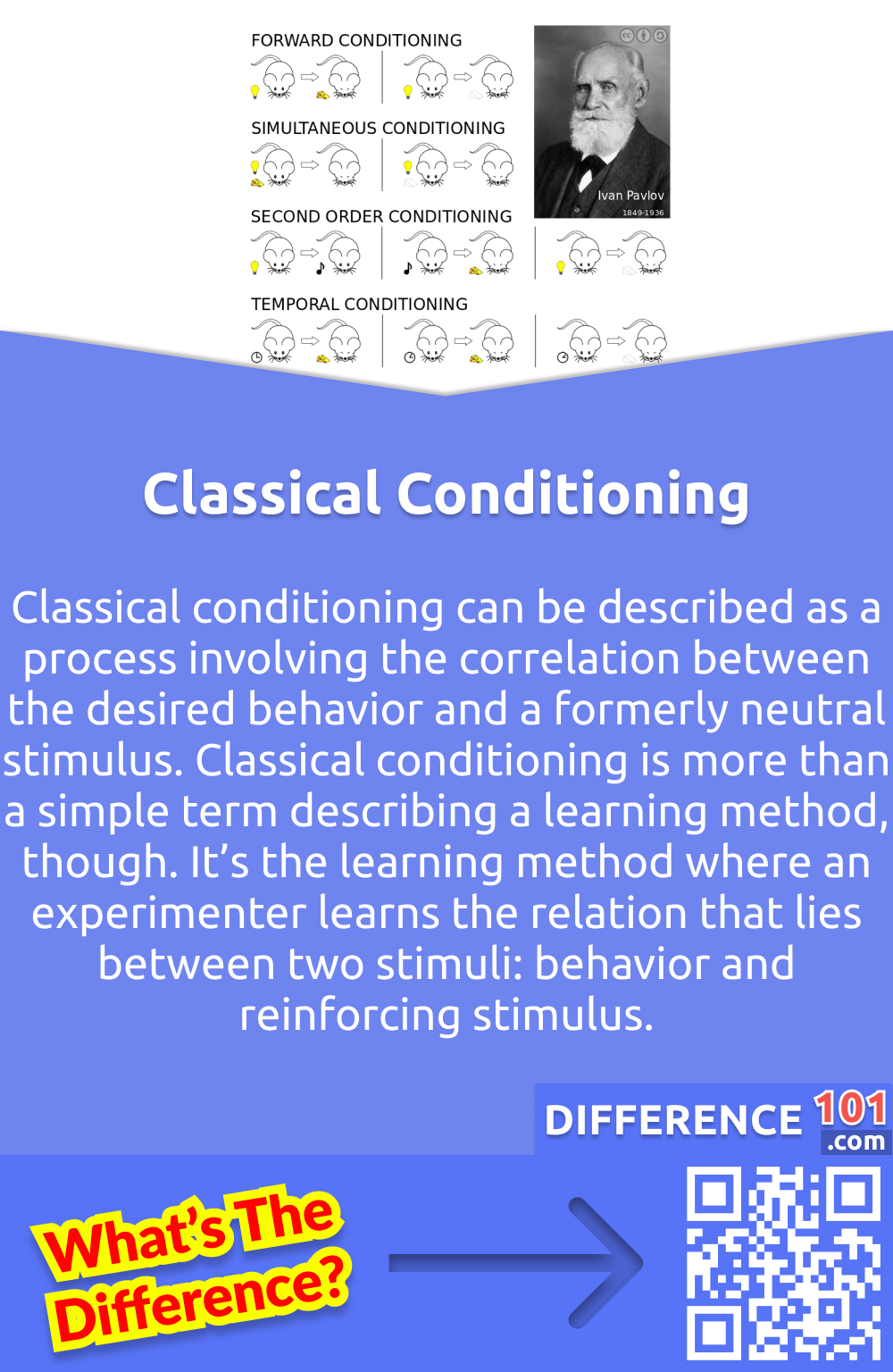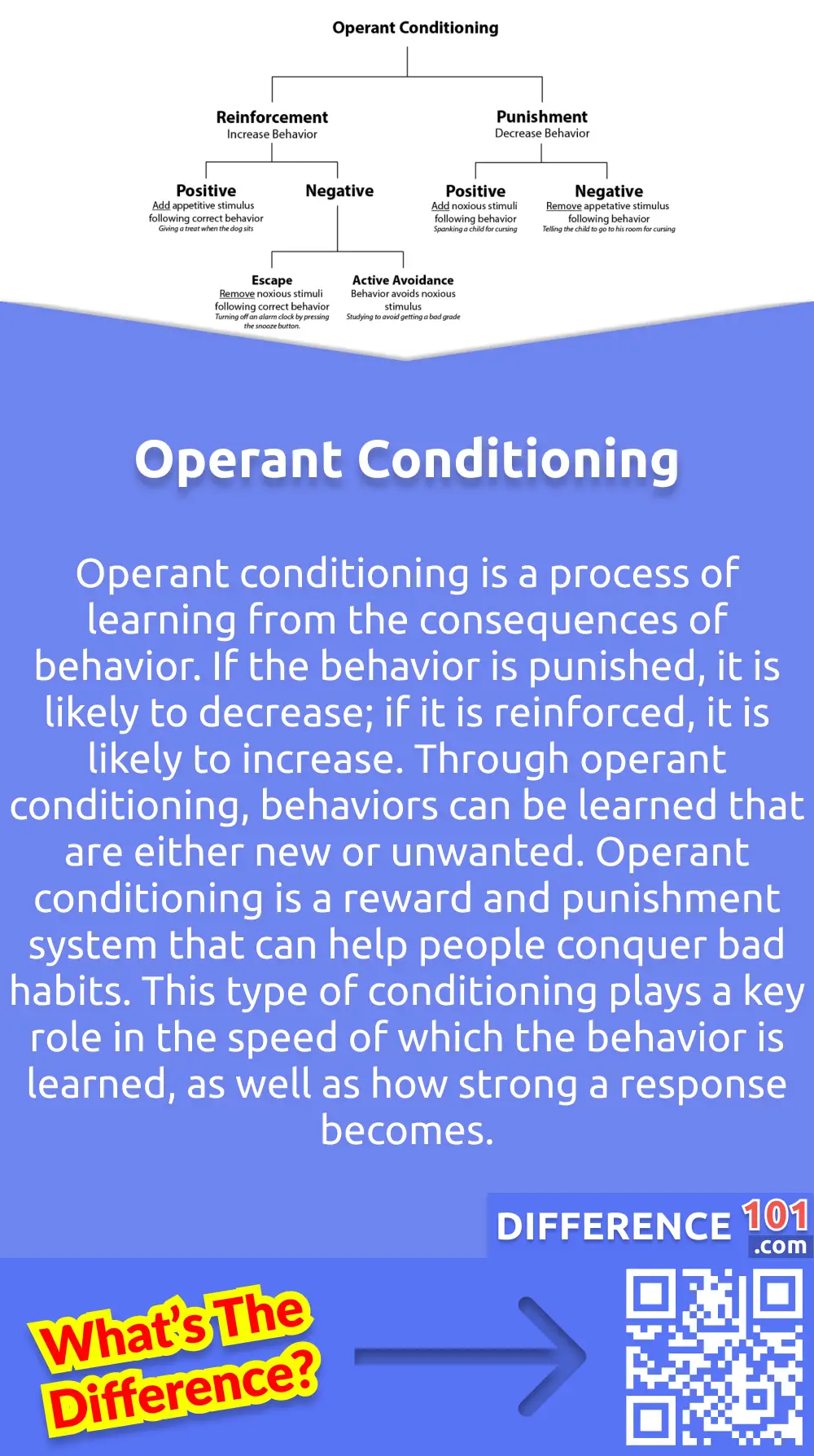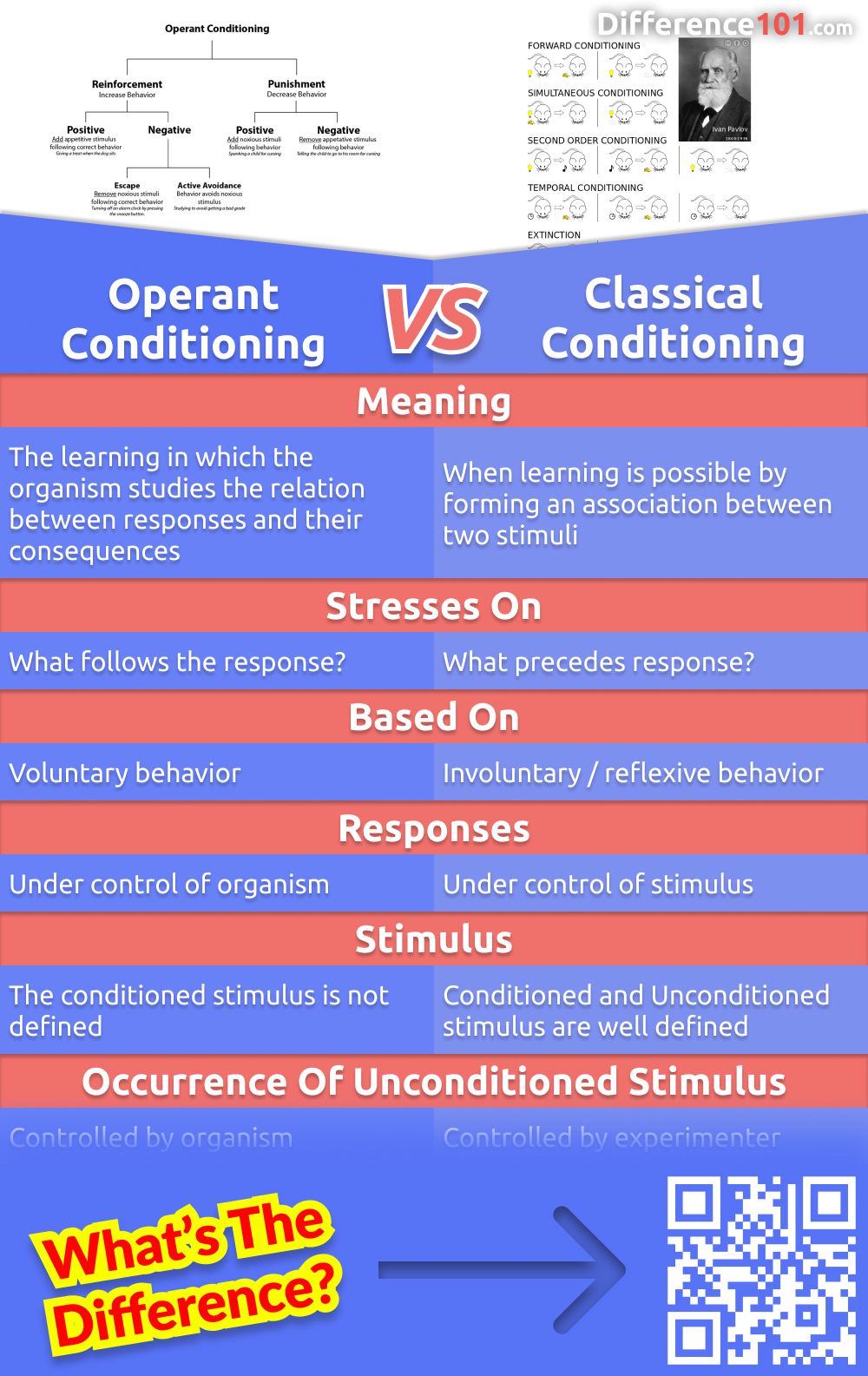Operant Conditioning vs. Classical Conditioning: Conditioning can be described as a kind of learning method that links stimuli to human behavior and responses. In other words, it involves associating two things to change someone’s behavior. The two main types of conditioning are operant conditioning and classical conditioning.
Table of Contents
What Is Classical Conditioning?

Classical conditioning can be described as a process involving the correlation between the desired behavior and a formerly neutral stimulus. Classical conditioning is more than a simple term describing a learning method, though. It’s the learning method where an experimenter learns the relation that lies between two stimuli: behavior and reinforcing stimulus.
What Is Operant Conditioning?

Operant conditioning is a process of learning from the consequences of behavior. If the behavior is punished, it is likely to decrease; if it is reinforced, it is likely to increase. Through operant conditioning, behaviors can be learned that are either new or unwanted. Operant conditioning is a reward and punishment system that can help people conquer bad habits. This type of conditioning plays a key role in the speed of which the behavior is learned, as well as how strong a response becomes.
What Is The Main Distinction Between Operant And Classical Conditioning?
Operant conditioning deals with changes in behavior as a direct result of experience. In contrast, classical conditioning refers to an involuntary response before a reply. In other words, operant conditioning helps individuals learn from their actions and experiences, while classical conditioning focuses on more reflexive, automatic responses.
Operant conditioning focuses on voluntary behavior, while classical conditioning deals with involuntary and automatic behavior. The two have several differences but belong to the larger conditioning category. Understanding these concepts, we can better understand how behavior is learned and changed.
What is the Difference Between an Unconditional and Conditional Stimulus?
An unconditioned stimulus elicits a response from an organism without any prior conditioning.
For instance, imagine a puppy conditioned to salivate at the sound a bell makes. This is a learned behavior, or conditioned response, associated with the arrival of food. The sound of the bell (conditioned stimulus) now elicits the same response as the sight of food (the unconditioned stimulus). This is an operant conditioning example.
8 Main Distinctions Between Operant Conditioning And Classical Conditioning
- One way to tell operant and classical conditioning apart is to consider them in terms of involuntary and voluntary behaviors. Classical conditioning is all about involuntary behaviors – things we do automatically without thinking about them. Operant conditioning, on the other hand, is concerned with voluntary behaviors – the things we do because we want to, or because we think there will be some reward in the end.
- The operant conditioning learning process was discovered by a Russian physiologist named Ivan Pavlov during the very early 1900s. Conversely, classical conditioning is a learning process first discovered by an American physiologist in 1938 called B.F. Skinner.
- Operant conditioning and classical conditioning are two different ways that organisms learn. Classical conditioning is when organisms learn to associate stimuli so that one predicts the manifestation of the other. Operant conditioning is when organisms are taught to behave based on the consequences of their previous behavior.
- In operant conditioning, the organism’s behavior is modified according to the outcomes. This is in contrast to classical conditioning, where conditioning processes involve the experimenter learning to associate stimuli based on involuntary responses occurring before it.
- Operant conditioning is based on voluntary behavior, while classical conditioning is contingent on reflexive or involuntary behavior. The former deals with the active organism’s responses, while the latter focuses on emotional and physiological responses such as feelings and thoughts.
- Operant conditioning occurs when an animal or person learns to associate a particular behavior with a particular consequence. Classical conditioning occurs when an animal or person learns to associate a particular stimulus with a particular response.
- Operant conditioning occurs when an animal or person learns to associate a particular behavior with a particular consequence. Classical conditioning, however, defines the unconditioned and conditioned stimulus. Operant conditioning doesn’t define the conditioned stimulus.
- An experimenter controls unconditioned stimuli. The reinforcer remains under an organism’s control. This active/passive dichotomy is an important distinction between operant conditioning and classical conditioning. In operant conditioning, the organism is actively engaged in seeking out reinforcement, while in classical conditioning, the organism is largely passive.
Comparison Table
| Basis | Operant Conditioning | Classical Conditioning |
|---|---|---|
| Meaning | The learning in which the organism studies the relation between responses and their consequences | When learning is possible by forming an association between two stimuli |
| Stresses on | What follows the response? | What precedes response? |
| Based on | Voluntary behavior | Involuntary / reflexive behavior |
| Responses | Under control of organism | Under control of stimulus |
| Stimulus | The conditioned stimulus is not defined | Conditioned and Unconditioned stimulus are well defined |
| Occurrence of unconditioned stimulus | Controlled by organism | Controlled by experimenter |
Comparison Chart

Comparison Video
Conclusion
The two most common kinds of conditioning are operant conditioning and classical conditioning. Although these conditioning types share similarities, their key differences determine the approach to use for specific learning situations.
Classical conditioning occurs when a previously neutral stimulus is paired with a stimulus that elicits a response, and eventually, the neutral stimulus comes to elicit the same response. In operant conditioning, the consequence of behavior determines if that particular behavior will possibly be repeated in the future.








